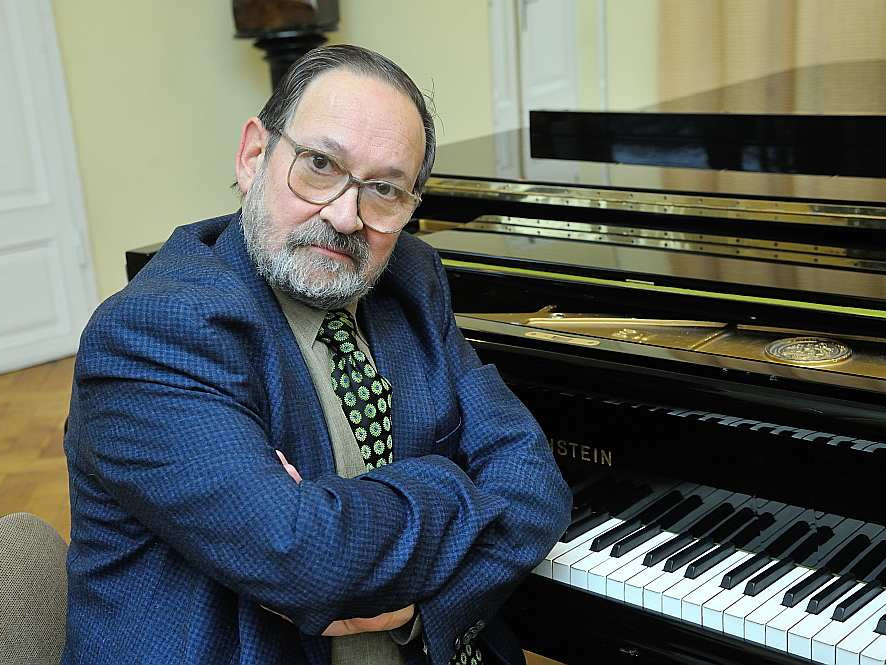Georgs Pelēcis
Imants Zemzaris, composer
The first time I met Georgs Pelēcis (b. 1947) could have been in the cloak room of the old Emīls Dārziņš Music School (now the Students’ Club of the Jāzeps Vītols Latvian Academy of Music). I was then a primary-school pupil, and this is where our parents and grandparents came to pick us up, dress us according to the weather conditions outside and then take us home.
I soon noticed that Georgs sang in the renowned Dārziņš School boys’ choir, obeying the hand movements of Krišs Deķis himself. So, he was a choir boy, and he took obligatory lessons not only in piano but also violin. That’s a plus in favour of Georgs, because it’s commonly said that a composer ought to have had experience holding at least a few orchestra instruments in his own hands.
We later met in Ģederts Ramans’ composition class. If Georgs class took place before mine, I was able to listen in on some of the conversations between the master and his apprentice about the Les Six and even Webern. I soon took a liking to Les Six myself, but not Webern.
And then Georgs kind of vanished from my field of vision, because he left to study composition with Aram Khachaturian at the Moscow Conservatory. This institution is a veritable forge of professional musicians, and I’m sure a broader world view opened up for him there.
However, he returned to Riga. And it seems that he returned with the Double Concerto for Balalaika and Saxophone (1970) under his arm.
But he won a large following of fans with New Year’s Music (1977/1979), which exists in versions for brass band and for piano. In it, the fragrance of ancient madrigals meets elements of rock music. This music, like the activities of Imants Kalniņš, addressed its contemporaries directly, on the street, hip-to-hip and lip-to-lip, bypassing the stiffness of concert halls. Or, stated more intelligently, Georgs was one of the first here to accept the minimalism (ritualism) and New Consonant Music paradigm.
The first three suites for piano followed soon after (1980–1985), which were similar in disposition to New Year’s Music with their happy, not overthought, diatonic characters, which in an essay at that time I gladly grouped together with contemporary Latvian “family music”. Because I knew that Georgs had two sons who were a bright source of inspiration for him creatively.
Georgs composed much chamber music, and one could sense that, like Bach or Tchaikovsky, he is an untiring, systematic composer.
Maybe here the “long mile” set in, so to say, when the God-given things have been generously spent, but the wisdom of maturity to fill the well-cultivated technical matrices still require one to wait. Something similar can be witnessed in the second half of summer, when all of the flowers have finished blooming, the greenness is fading and turning yellow, but there’s still plenty of time before the harvest. I believe this is a fairly typical evolution of a creative personality.
When the premieres of the Fifth and Sixth Piano Suites (2008) arrived, it seemed that, well, Georgs is surely outdoing himself... But, oh, what a surprise – this slow, elegiac music confirmed his deep maturity on a path through the thorns to the stars. He soon said: “My life has entered the autumn phase. That’s neither good nor bad, it’s just the way it is...”
One of Georgs’ most significant new compositions is the voluminous Piano Concerto Musica confinanta (2014), which seems to contain his whole life.
I myself am partial to Georgs’ wonder-filled dedications to lilacs, jasmine, lilies of the valley. The two of us agree that this (God-Nature-Beauty) is the last thing we have to hold on to in wonder and adoration as the world around us attempts to smother itself with the steely embraces of drones, robots and cyber-aggression.
I will not write about the internationally renowned interpreters of Georgs’ music, with which he has been truly fortunate. And let others evaluate his contribution as a researcher-musicologist.
He is a polyphonist, but not the kind who tries to break free of gravitation through his macromicropolyphonic ability and abandon. It seems he is closer to Ockeghem and Obrecht – with both feet firmly on the cobblestones in the tranquil, warm, human-scaled historical centre of some northern European city.
But otherwise? In his scale-based, harmonically aesthetic conviction? What is Georgs Pelēcis like? To me, he seems to stand between Sviridov and Melngailis...
20.03.2018. "Music in Latvia 2018"

